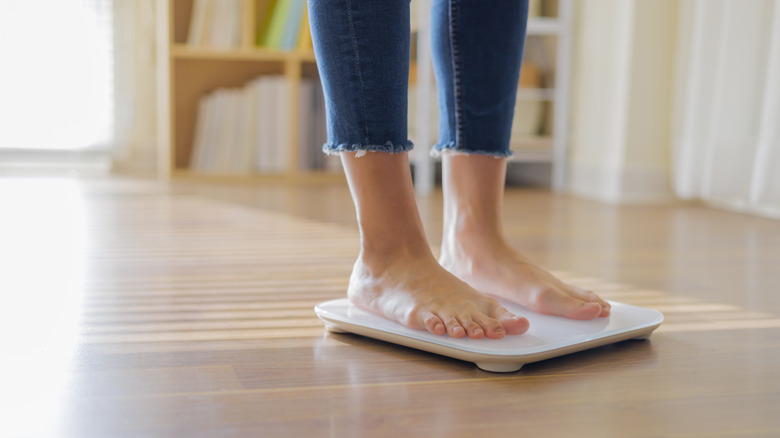What Happens To Your Metabolism When You Don't Eat Enough Protein
You've been looking more at what you put into your mouth lately after noticing the importance of having a well-balanced meal plan. You know the importance of fruits and veggies, but proteins must also take up a substantial amount of your plate. Why? Proteins are the building blocks your body uses to build, repair, oxygenate, and regulate your body, according to Piedmont. The chef and dietician Nancy Waldeck told Piedmont, "It is important for individuals to consume protein daily. Daily protein intake plays a role in keeping your cells in good shape and should be part of your daily health maintenance plan."
Proteins can come from different sources depending on the diet you're currently eating. For example, those eating an average omnivore diet get their protein from lean meats, poultry, eggs, seafood, dairy, legumes, and nuts, according to the Better Health Channel. However, those on a vegetarian or vegan diet cut out the meat and, potentially, dairy, leaving only plant sources like nuts and legumes. Cutting down your protein sources can make things more challenging, but it's not impossible to meet your requirements of 10% to 35% of your daily calories (per Mayo Clinic).
Not meeting these needs can have a major impact on your body, including making your metabolism slow down to a crawl. Let's explore why your metabolism slows down and how it affects your hunger.
Passing on protein makes your metabolism slow down
Slowing your metabolism isn't something anyone wants, especially those trying to lose weight. However, understanding the why can be a little complicated.
To understand how this works, you must realize that just living burns calories, so getting up, breathing, and even going to the bathroom burns calories. What you eat can increase or decrease your energy expenditure for the day. Compared to high-carbohydrate diets, those high in proteins have been shown to speed up metabolism during weight loss because they increase your total energy expenditure, including the energy your body expends just living, according to 2015 research in Clinical Nutrition. Continuing on a high-protein diet, even after the weight is lost, helps keep your energy balanced so the weight isn't gained back. Research in 2012 in JAMA also backed this up by showing that low-carb diets resulted in the least decrease in resting energy expenditure and total energy expenditure compared to low-fat and low-glycemic-index diets.
All this research has one conclusion: Not eating enough protein can slow down your body's natural resting expenditure and lead to a positive energy balance, which means a slower metabolism. Meeting or exceeding your daily protein requirements can speed everything back up.
Protein deficiency can make you hungrier
Along with causing you to have a slower metabolism, insufficient protein makes you ravenous. It's been shown that protein is more filling than carbohydrates or fat. Additionally, a study in 2008 in The Journal of Nutrition looked at the eating habits of 22 young and older men when their protein needs were unmet. It found that inadequate protein, below the recommended daily amount, was linked with greater hunger and desire to eat compared to diets with higher than the daily recommended amount of protein, regardless of age.
It's also important to note that eating protein in every meal is essential to staying full and fighting hunger. Michael Garcia, M.D., a UCLA Health clinical nutritionist, told UCLA Health, "We're able to store certain nutrients, but we can't do the same thing with protein. And our bodies can only use so much protein in a sitting and a day." So, gobbling up your daily protein in one sitting will only keep you full for so long. Protein needs vary for everyone, added Dr. Garcia, but he usually advises eating about 25 to 30 grams per meal to ensure that you are getting enough.
Using protein powders can also be beneficial. These are based on plant and animal protein and can be slipped into a smoothie or meal to give you a little boost but watch for added fillers.



